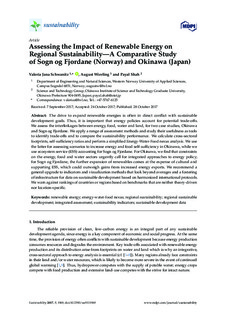Assessing the Impact of Renewable Energy on Regional Sustainability—A Comparative Study of Sogn og Fjordane (Norway) and Okinawa (Japan)
Journal article, Peer reviewed
Published version
Permanent lenke
http://hdl.handle.net/11250/2592119Utgivelsesdato
2017Metadata
Vis full innførselSamlinger
- Import fra CRIStin [3604]
- Institutt for miljø- og naturvitskap [528]
Originalversjon
Schwanitz, V., Wierling, A., & Shah, P. (2017). Assessing the impact of renewable energy on regional sustainability—a comparative study of Sogn og Fjordane (Norway) and Okinawa (Japan). Sustainability, 9(11). 10.3390/su9111969Sammendrag
The drive to expand renewable energies is often in direct conflict with sustainable development goals. Thus, it is important that energy policies account for potential trade-offs. We assess the interlinkages between energy, food, water and land, for two case studies, Okinawa and Sogn og Fjordane. We apply a range of assessment methods and study their usefulness as tools to identify trade-offs and to compare the sustainability performance. We calculate cross-sectoral footprints, self-sufficiency ratios and perform a simplified Energy-Water-Food nexus analysis. We use the latter for assessing scenarios to increase energy and food self-sufficiency in Okinawa, while we use ecosystem service (ESS) accounting for Sogn og Fjordane. For Okinawa, we find that constraints on the energy, food and water sectors urgently call for integrated approaches to energy policy; for Sogn og Fjordane, the further expansion of renewables comes at the expense of cultural and supporting ESS, which could outweigh gains from increased energy exports. We recommend a general upgrade to indicators and visualization methods that look beyond averages and a fostering of infrastructure for data on sustainable development based on harmonized international protocols. We warn against rankings of countries or regions based on benchmarks that are neither theory-driven nor location-specific.
Utgiver
MDPITidsskrift
SustainabilityOpphavsrett
© 2017 by the authorsBeslektede innførsler
Viser innførsler beslektet ved tittel, forfatter og emneord.
-
Improving the Sustainability of HVL: A Translation of the SDGs for Higher Education Institutes and HVL Stakeholders’ Perceptions, Engagement and Recommendation in Relation to HVL Sustainability
Slaymark, Victoria; Zeiss, Jan (contributor) (Master thesis, 2018-05)Higher education institutes (HEIs) have the potential to be key actors and leaders to transform society towards sustainable development (SD). They must function themselves as ‘Living Labs’, adopting a whole systems approach ... -
(Re)imagining Entangled Sustainability: A Human and Nonhuman Theorisation of Belonging to Safeguard Sustainability’s Holism
Sadownik, Alicja R.; Gabi, Josephine (Peer reviewed; Journal article, 2021)After years of research and theorisation connected to education for sustainable development, the holistic core of sustainability seems to have disappeared within the frames of the social, environmental and economic pillars. ... -
Becoming Child and Sustainability — The Kindergarten Teacher as Agency Mobiliser for Sustainability Through Keeping the Concept of the Child in Play
Crisostomo, Anita Tvedt; Reinertsen, Anne Beate (Peer reviewed; Journal article, 2021)In this article, we seek to theorize the role of the kindergarten teacher as an agency mobiliser for sustainability through keeping the concept of the child in play, ultimately envisioning the child as a knowledgeable and ...

